Quietly, a chorus of wise voices spoke for a future where every leaf on the earth would still tremble with life. They reminded us that Ukraine’s fate must be decided by Kyiv itself, that any path toward peace must begin with a ceasefire or de‑escalation, and must carry security guarantees strong enough to shelter sovereignty like a sturdy oak against storm. They spoke of freedom, of choices made by the people most touched by danger, and they kept the door open to negotiations that acknowledge the current front line as a starting point rather than a final map. The note they struck did not hinge on any one alliance’s naming, but rather on a shared conviction: that a meaningful peace cannot be scripted by conquest, but authored by the resilience of those who live on the land. They pledged continued support—military, financial, human—and urged diplomacy that blends steady pressure with genuine dialogue, while the call for a just resolution echoed as a steady drumbeat beside the need for safety and dignity for every civilian.
And yet, beneath the parchment of promises, the Earth itself bears witness to a pain too long endured. The land, once bright with the breath of wheat and wildflowers, bears the scars of men’s and women’s quarrels: soil churned by bombs, rivers muddied by fear, forests askance with smoke, seeds crushed beneath the boots of fear. This is not merely a political dispute; it is a fracture in the body of Gaia. In this modern theater, colonial echoes hum through the air—borders drawn as if the earth were a blank canvas for human will, peoples displaced as if their homes were mere waypoints on a map. The sins of empire—extracting land, imposing order, erasing right to self‑determination—linger like resin on wood, slowing the healing of entire ecosystems and the futures of generations to come.
And the engine behind so much hurt is the toxic engine of capitalism that treats life as collateral and profits as prophets. The arms trade thrives on fear, while subsidies and profit motives fuel cycles of violence that reach far beyond frontlines, siphoning grace from communities that already carry heavy burdens. Security becomes a brand of warfare when it is funded by the destruction of forests, the draining of aquifers, and the contamination of fields meant to feed children. In the name of balance or stability, we perpetuate a system that buys time with human suffering and markets the cheap illusion of safety to those who can still pay. The beloved Earth pays the true price—biodiversity dampened, soils eroded, caretakers torn from their homes, and a climate already sickened by the smoke of conflict.
Let us hold fast to a different promise. A peace rooted in healing must honor the sovereignty of the land and its people, yes, but also the sovereignty of every living thing—air that is clean enough to breathe, soil that remembers rain, rivers that carry stories of resilience. A just peace cannot be built on the shoulders of victims, nor can it trade a future for a fleeting advantage. It must be inseparable from ecological justice: ceasing new arms sales, repairing the harm done to communities and ecosystems, honoring humanitarian needs with real, rapid aid, canceling debts that tether the vulnerable to cycles of crisis, and investing in climate‑resilient recovery that restores farms, forests, and watersheds.
May our diplomacy be as gentle as a dawn breeze yet as steady as the roots of an ancient tree. Let treaties be rooted in reverence for life, in accountability for harm, and in a vision of abundance that renews rather than exhausts. Let us imagine a path where humanity and Earth walk hand in hand toward a future shaped by care, not conquest; where Kyiv’s liberty and Ukraine’s future are safeguarded not through domination, but through shared stewardship of a fragile, beautiful world. If we permit that transformation, the healing of nations can become the healing of the land, and both can become a vow to nurture all beings for many generations to come.
